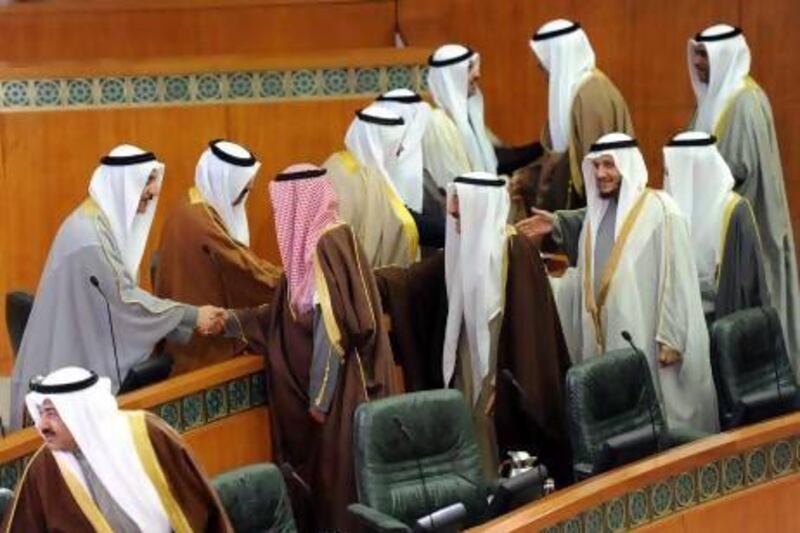Kuwait's emir inaugurated a newly elected parliament yesterday, denouncing escalating opposition demonstrations as "treason" and vowing a firm response.
Not far from where Sheikh Sabah Al Ahmad Al Jaber Al Sabah spoke, hundreds of opposition politicians and youth activists gathered near the Palace of Justice in downtown Kuwait City to protest against the assembly's convening.
"We don't approve of the parliament's inauguration," said one protester by phone from the capital. "We don't think it is legitimate."
Kuwait has one of the Arabian Gulf's most open political systems but, in recent months, a debate has erupted over the extent of democracy in the country. Opposition forces have called for greater participation, including the ability to form a government, currently the prerogative of the emir.
Yesterday's protesters, who boycotted the elections for the new national assembly, began their demonstration on the eve of the new parliament's inauguration by gathering in the area of the Central Bank complex - the first time protests have touched the core of the capital. Several hundred demonstrators stayed overnight.
By morning, the protesters attempted to move directly across from the parliament building as the new assembly held its first session, but activists said they were blocked by security forces and at least three protesters were arrested.
Demonstrators say they are contesting the legitimacy of the new assembly, which was elected on December 1 using a new system that the opposition says was unjustly crafted by the emir while parliament was out of session.
A former opposition MP, Musallam Al Barrak, promised on Saturday to continue demonstrations "until this parliament of puppets collapses". The next protests are planned for tomorrow evening.
But the emir was defiant in his remarks, criticising the continuing protests at length, the state news agency reported.
Ongoing demonstrations are "a setback in the civil accomplishments that neither portrays true democracy, nor the state of the law and the institutions", he said at the legislature's opening.
"These [incidents] contradicted principles of our Kuwaiti society, its deeply rooted covenants and its well-known trait of mutual respect, moderation, tolerance and acceptance of others' opinions."
Because of the opposition boycott, Kuwait's new parliament is largely composed of pro-government MPs, but with rising street anger, they will face difficulties in setting a bold agenda in the coming weeks.
Kuwait's prime minister, Sheikh Jaber Al Mubarak Al Hamad Al Sabah, urged the legislators to take up widespread calls made by both pro-government and opposition camps to move ahead on economic-development projects that have largely stalled amid the country's political turmoil.
The new parliament should "realise [the] aspirations of all citizens through real and genuine achievements [and] to push forward construction and development and push reforms", he said.
Activists in Bahrain said that police fired tear gas at anti-government protesters who took to the streets after an annual address by the Gulf nation's king marking National Day.
Further demonstrations were planned for today, a day opposition supporters call Martyr's Day, to mark the deaths in 1994 of the first two anti-government activists to die in agitations that lasted half a decade.
The activists brandished posters and photos of relatives and friends who have been among the at least 55 to die since Arab Spring unrest erupted in the country last February.
Over the weekend, King Hamad bin Isa Al Khalifa pardoned 247 inmates, a move that the largest Shia bloc, Al Wefaq, had pushed for, urging the government to use National Day as a time to offer a gesture of reconciliation.
"National Day is an opportunity," said Jasim Hussein, a former Wefaq MP. "A peaceful solution is still possible."
* with additonal reporting by the Associated Press





